As we age, it’s important to prioritize activities that promote mental, physical, and emotional well-being, especially for those with dementia.
Engaging in creative and fun activities can reduce the progression of cognitive decline while enhancing quality of life. Additionally, stimulating at-home activities for seniors with dementia can bring joy and decrease agitation.
In this blog post, we’ve listed 52 cognitive activities for seniors with dementia. If your loved one has dementia, these brain, body, and social activities are designed to stimulate their mind and boost their morale.
At Ohana Care, we provide in-home care services for seniors with dementia. Our dementia care services are designed to enhance the overall well-being of those living with dementia or Alzheimer’s disease, allowing them to continue living a fulfilling and rewarding lifestyle. Our caregivers would be more than happy to support your loved one with any of the activities included in this article.
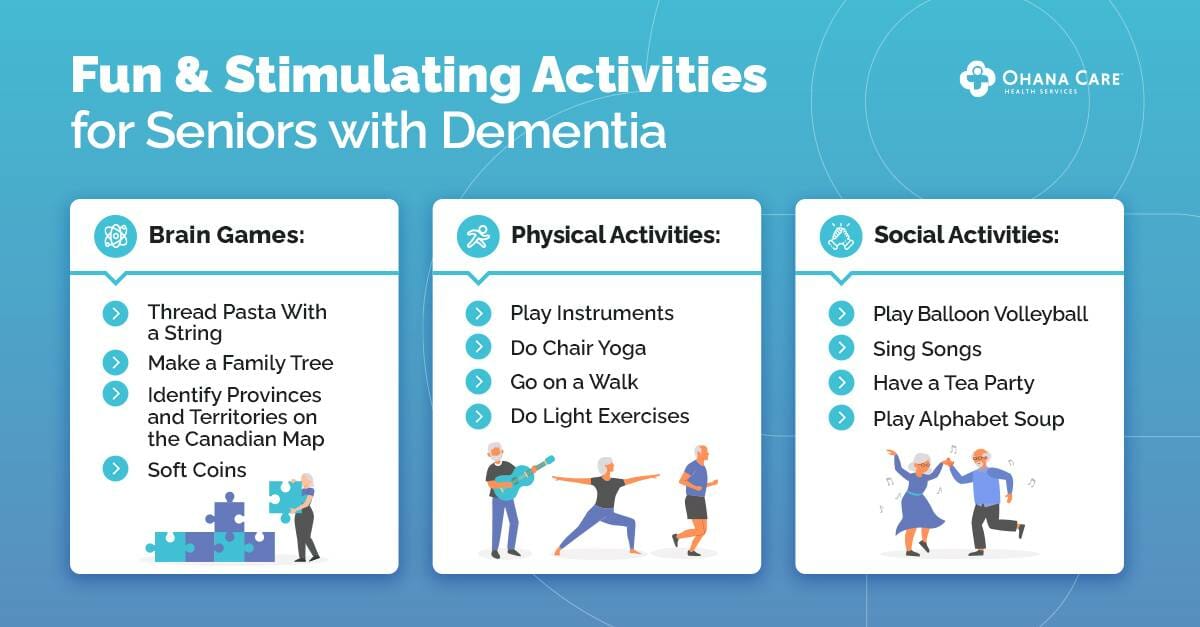
Brain Activities
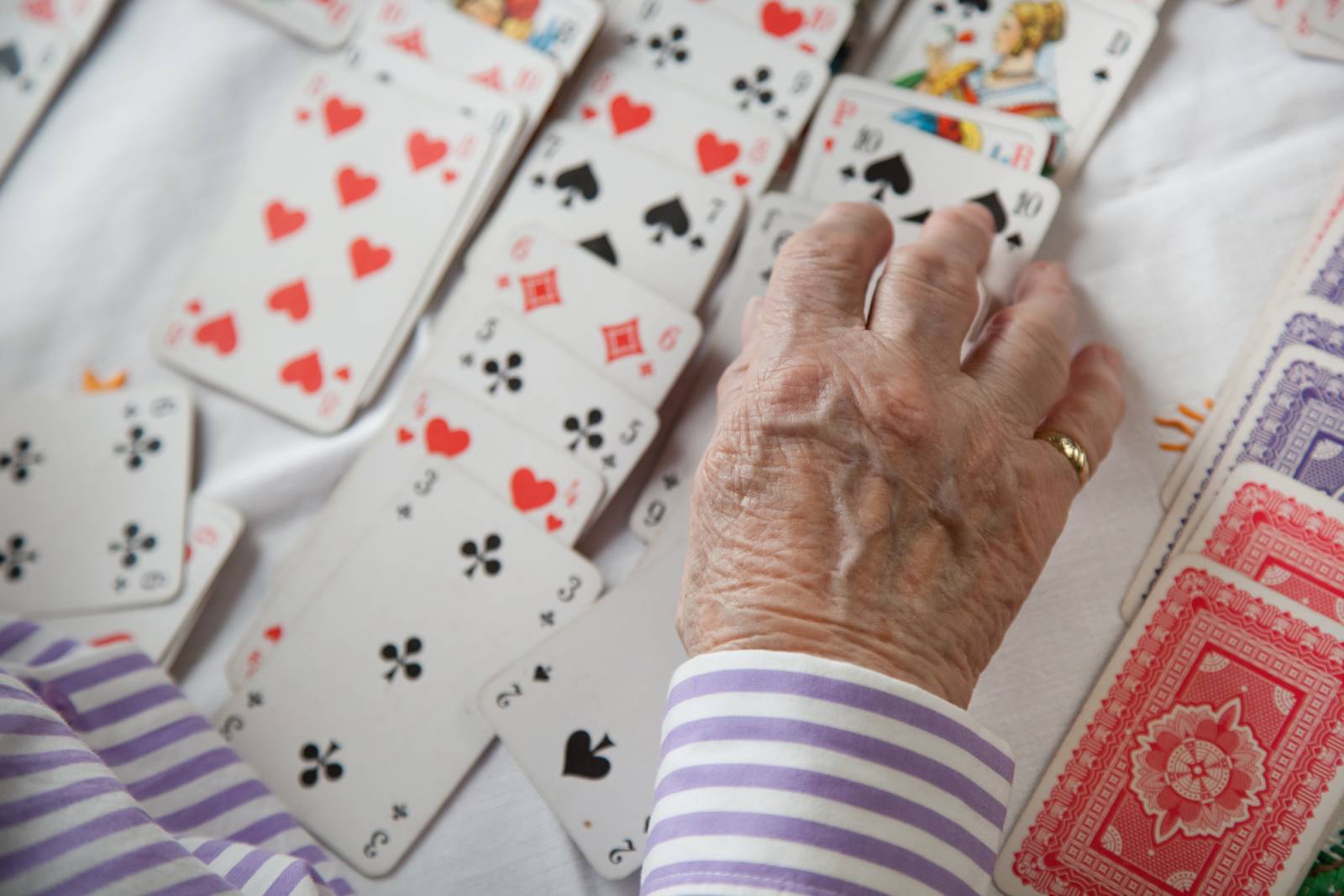
Brain games offer a range of benefits for people with dementia or Alzheimer’s disease, including improving memory, increasing attention span, and enhancing problem-solving skills. The following activities can help your loved one exercise their mind.
1. Jigsaw Puzzles
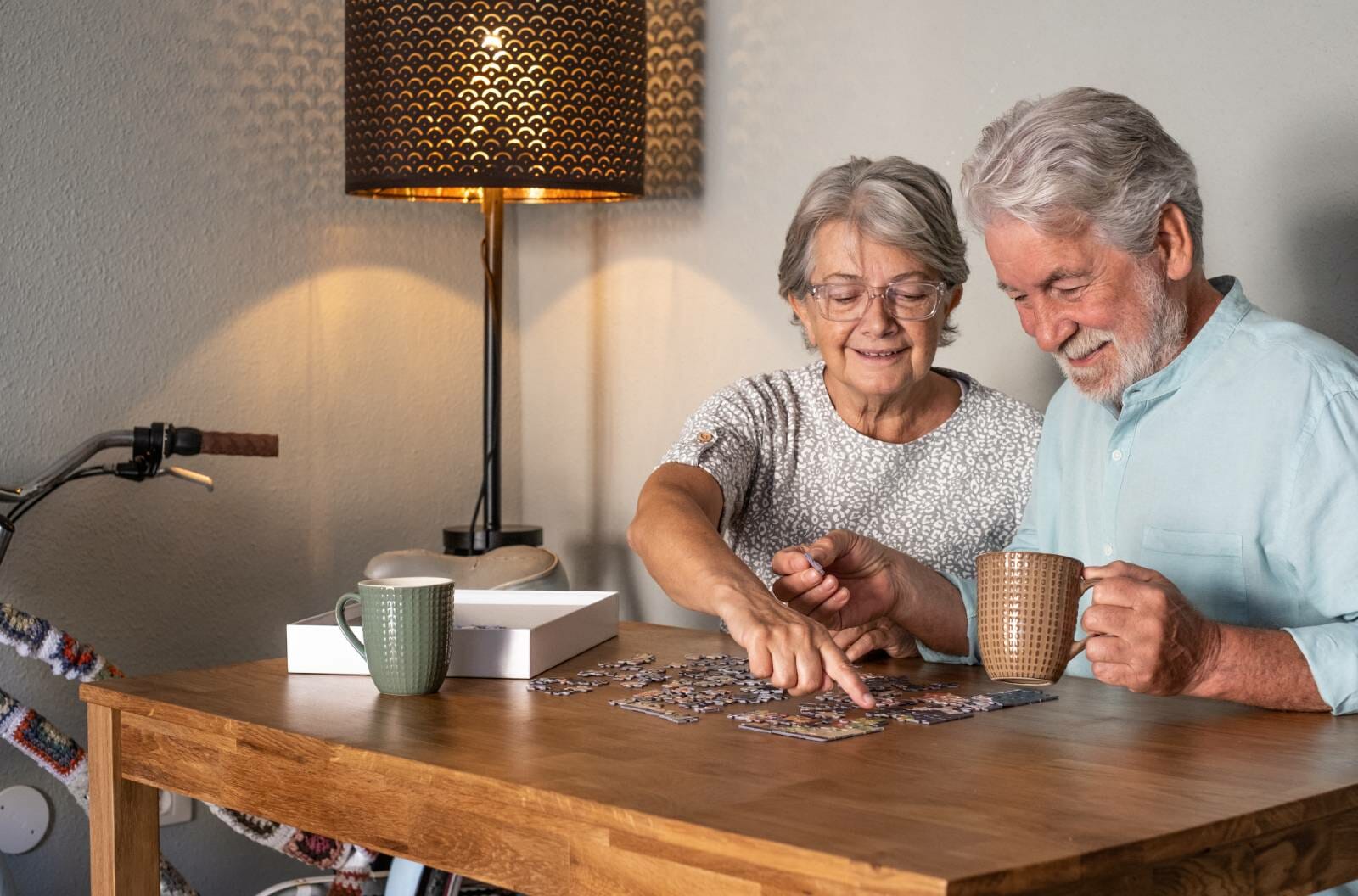
Difficulty level: Medium
Jigsaw puzzles can enhance mental speed and help your loved one improve their short-term memory. We recommend those in the early stages of dementia focus on 100-piece puzzles, while those in the middle stages focus on a maximum of 60-pieces, and those in the late stages focus on smaller puzzles.
2. Painting
Difficulty level: Easy
Painting promotes multi-sensory stimulation and helps keep seniors with dementia happily engaged while encouraging self-expression through unique colours and shapes.
Some finger painting ideas include:
- A bouquet of flowers
- Animals
- A family member
- Portraits
3. Write Letters to Loved Ones

Difficulty: Medium
To help your loved one remember positive memories, encourage them to write letters to their loved ones. Writing letters can help them express their thoughts and feelings and engage their cognitive abilities, such as language skills, vocabulary, and organization.
4. Colour-By-Numbers
Difficulty: Medium
Colour-by-number books are great for seniors with dementia as they have many therapeutic benefits, helping them feel calm and collected. Additionally, they help with cognitive stimulation, enhance creativity, and, when complete, can help your loved one feel accomplished.
5. Crossword Puzzles

Difficulty: Medium-Hard
Crossword puzzles are highly beneficial for those in the early stages of dementia. They help keep the brain sharp and stimulate cognitive abilities like problem-solving skills, memory, and vocabulary.
6. Watch Documentaries

Difficulty: Easy
Watching documentaries can elicit comforting memories and help your loved one reconnect with their distant past. Documentaries about a sporting event, historical event, animals, or musicians can uplift spirits.
Some easy-to-watch documentaries include:
7. Thread Pasta With a String
Difficulty: Medium
Threading pasta on a string is a great way to improve fine motor skills and is a fun activity for seniors with dementia. You will need dry rigatoni noodles and a string to set up this activity. Simply cut the string to your desired length. Then, instruct your loved one to thread the string through the pasta noodles.
8. Play Simple Computer Games

Difficulty: Medium
Although it’s best to not only spend time on laptops, tablets, or smartphones, a handful of fun computer games can help promote positive feelings and work the brain.
Online game ideas:
When choosing a game, try to get your older adult to start on a basic game, as some games may become too difficult, which could cause stress and frustration. It’s important to set them up with failure-free activities.
9. Paint Pottery
Difficulty: Easy
Pottery painting is a great way to use fine motor skills while promoting creativity and self-expression.
Supplies:
10. Knit
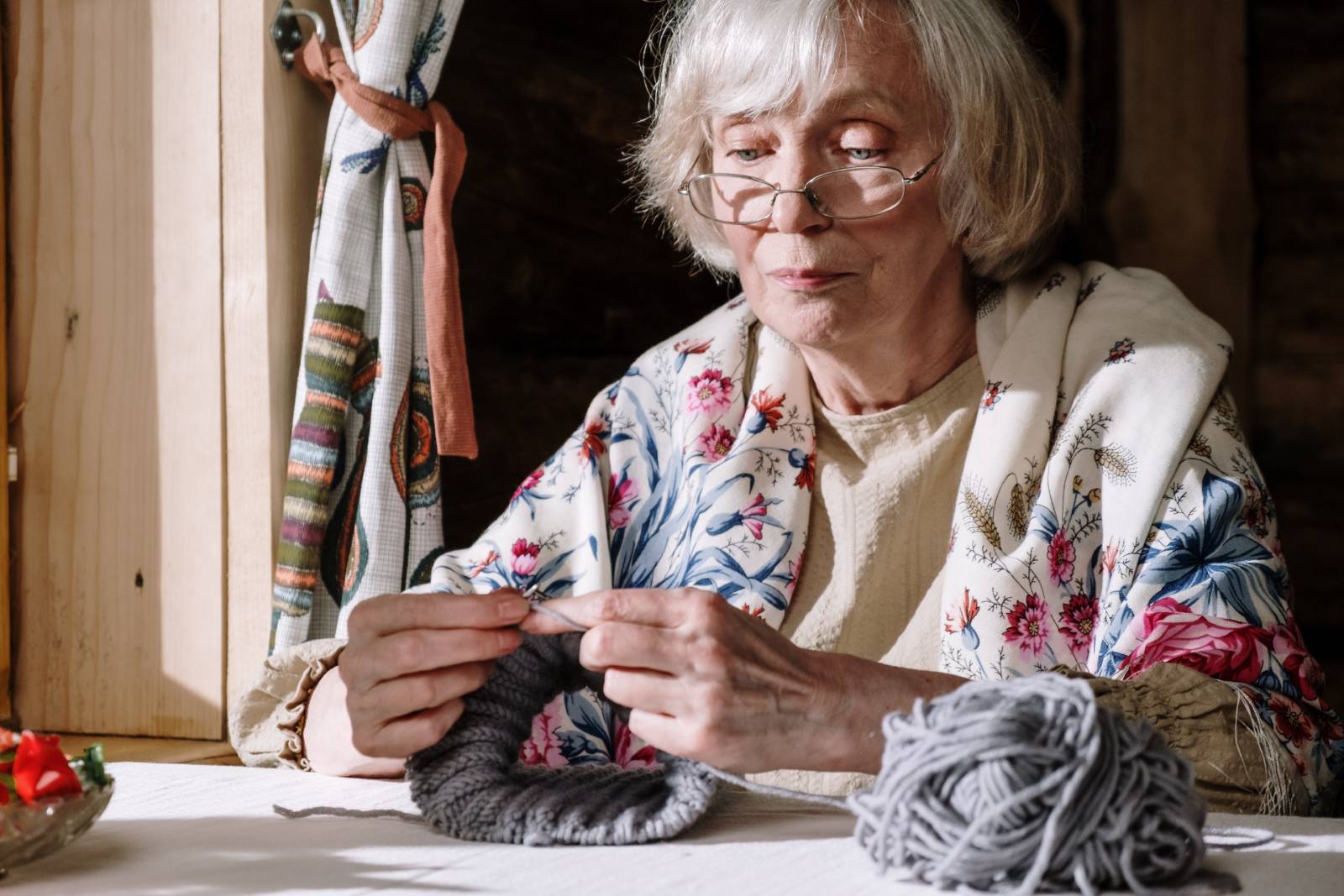
Difficulty: Medium
Knitting is a great way to promote fine motor skills and cognitive abilities since it is a repeated motion.
Knitting can be tricky for those who have never knitted before. If you or your loved one have never knit before, follow along with this beginner
11. Do Household Chores
Difficulty: Easy
Household chores can help older adults feel included in everyday activities, which can increase their mood and well-being.
Some easy household chores include:
- Sorting socks
- Folding hand towels
- Sweeping floors
- Folding laundry
12. Watch Favourite Movies/TV Shows
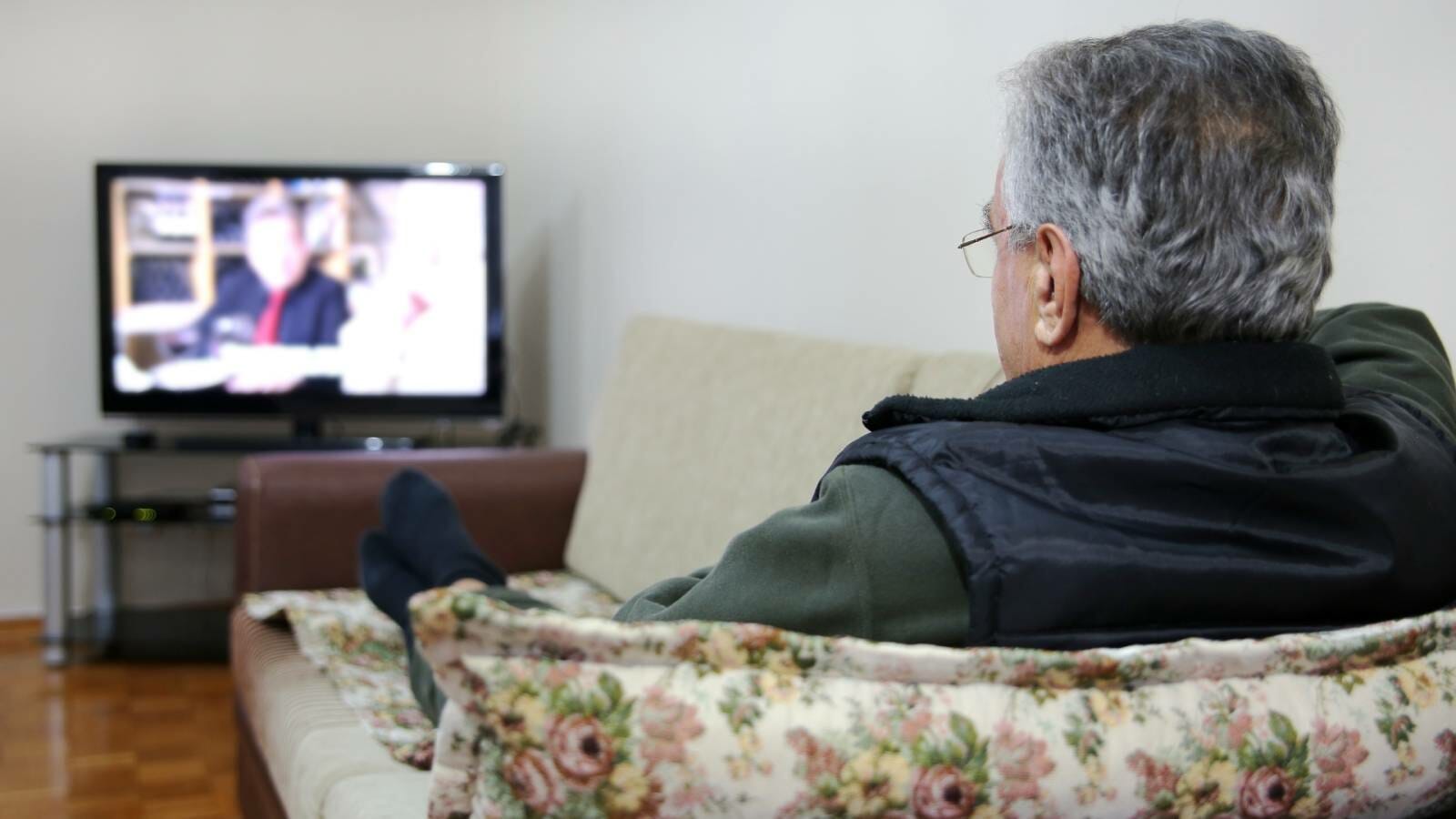
Difficulty: Easy
Letting your loved one watch their favourite movie or television show can provide a form of reminiscence therapy that uses sensory or visual cues from their past. It can help them remember happy memories and boost energy levels.
13. Play Solitaire
Difficulty: Medium
Solitaire mentally stimulates the brain and engages cognitive abilities such as problem-solving, attention to detail, and memory. Solitaire also requires players to make decisions, think about their actions, and strategize.
Your loved one can play solitaire with a classic card deck or on the computer.
14. Card Matching
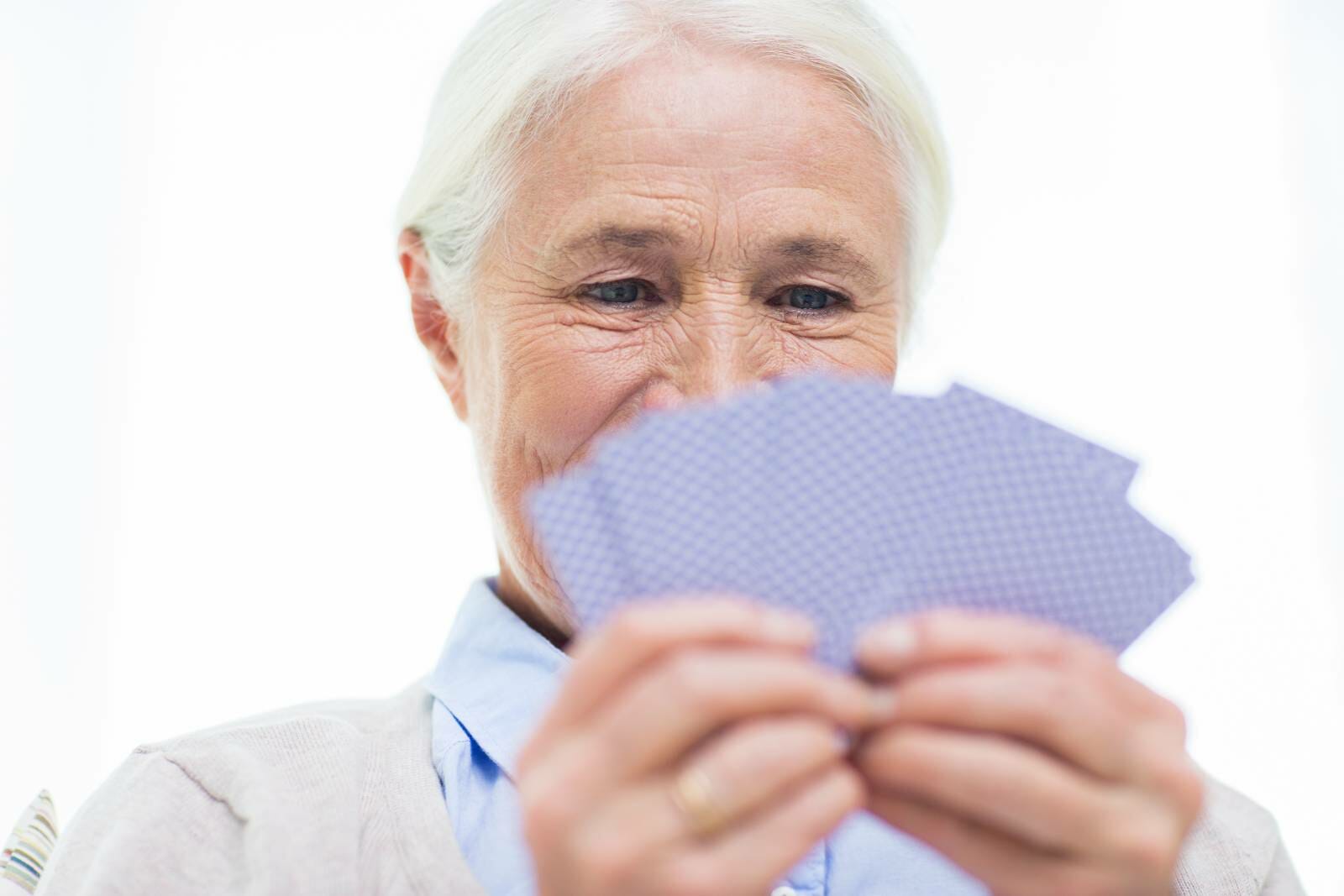
Difficulty: Medium
Card matching games can help train the brain as it requires your loved one to look at two seemingly identical images and look for minuscule differences.
Card game ideas:
- Match a Pair of Birds: A Memory Game
- Pick a Flower: A Memory Game
- Bob Ross: A Happy Little Memory Game
15. Make a Volcano
Difficulty: Medium
Making a volcano is a fun activity that will help maintain cognitive health while lifting spirits.
Supplies:
- Volcano supplies: small bowl, cup, baking soda, dish soap, water, vinegar, red food colouring
Follow along with this video to see how to make a volcano so you can better relay the instructions to your loved one:
16. Read Books
Difficulty: Medium
Not only can reading reduce feelings of stress and anxiety, but it can also improve cognitive function and help maintain language skills.
Tips on what books to choose:
- Books with simple material that is easy to read and comprehend
- Books with images
- Books with shorter texts rather than big paragraphs
17. Sensory Boxes
Difficulty: Easy
Touch and tactile stimulation is an excellent way for seniors with dementia to retain and remember information involving their senses. Additionally, sensory activities are known to cause feelings of relaxation.
18. Sort Coins

Difficulty: Easy
Sorting coins is an easy activity to set up and offers a variety of benefits for those with dementia. All you have to do is provide your loved one with an assortment of coins and then allow them to sort them based on monetary value. Coin sorting stimulates cognitive abilities, boosts fine motor skills, and reinforces numeracy skills.
19. Create a Photo Album
Difficulty: Medium
If your loved one can access old family photos, encourage them to create a photo album. Making a photo album will remind them of their younger years and help them reflect on positive experiences.
20. Untie and Tie Knots

Difficulty: Medium
Grab a couple of short pieces of rope and create knots. Then, try and get your loved one to untie the knot. This activity allows your loved one to work on their fine motor skills and learn to become more patient and persistent.
21. Identify Provinces and Territories on the Canadian Map
Difficulty: Medium
Simply print out a map and encourage your loved one to identify specific provinces and territories on the Canadian map. We recommend you use a map of a country or place your loved one was once familiar with to make this activity easier.
22. Listen to Music

Difficulty: Easy
According to the Alzheimer’s Association, studies have shown that music can improve behavioural issues and reduce agitation in those with dementia. Even those in the late stages of Alzheimer’s have been able to sing along with lyrics or tap a beat to memorable songs.
Song ideas:
23. Write Short Poems

Difficulty: Hard
If your loved one has creative abilities, encourage them to write short acrostic poems. Writing poems will help them with their writing, language, and memory skills. It will also help them reduce stress and express themselves.
24. Sort Skittles
Difficulty: Medium
Sorting Skittles by colour is an enjoyable activity that engages cognitive skills such as visual perception, attention to detail, and the ability to categorize. Encourage your loved one to sort the Skittles on the table based on their colour.
Supplies:
- Skittles
- Bowl
- Spoon
25. Look Through Old Photo Albums
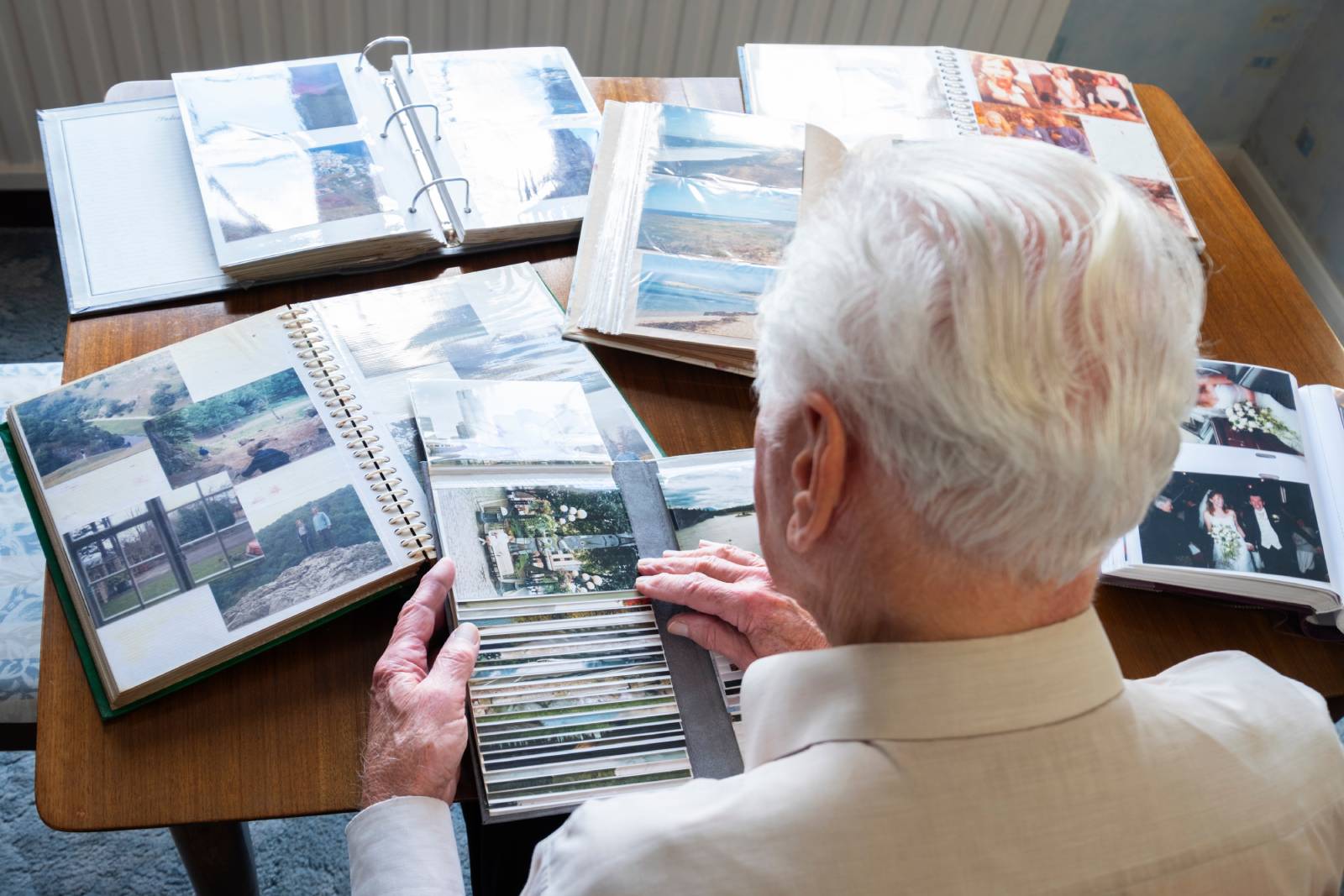
Difficulty: Easy
If you or your loved one has access to an old photo album, encourage them to look over it every once in a while. By reflecting on past events, your loved one can recall positive memories, making them feel happier.
26. Make a Family Tree
Difficulty: Hard
Help your loved one create a family tree. When creating a family tree, discuss relationships, childhood memories, and more to help with memory recall and connect them to their past. You may have to engage with other family members to help your loved one create an accurate family tree.
27. Interact With Animals
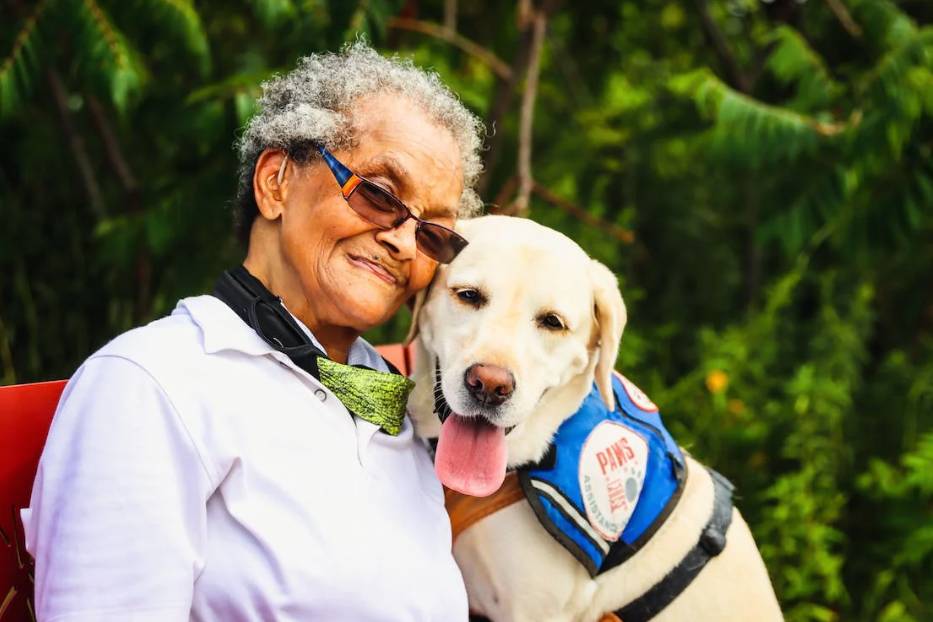
Difficulty: Medium
Interacting with animals is like pet therapy, as it can help reduce anxiety, loneliness, and depression while promoting emotional well-being. Due to animals’ calming effect, petting or cuddling animals can also help decrease agitation and behavioural issues.
28. Play Alphabet Soup
Difficulty: Easy/Medium
Alphabet soup is a game where a person must scoop out a letter from a large bowl and place all of the letters in alphabetical order. This game will help your loved one with cognitive abilities, language skills, and fine motor skills.
Supplies:
- Large bowl
- Water
- Letters of the alphabet
- Kitchen tray (or table)
- Spoons
29. Build Lego

Difficulty: Easy
Building things with Lego is a great way to encourage creativity, improve cognitive skills, and work on fine motor skills.
30. Word Searches
Difficulty: Medium
Word searches are a fantastic way to help seniors with dementia with their language skills and recall necessary information from their memory.
There are a variety of word searches available on Amazon, including Easy Word Searches for Seniors in Large Text. You can also print out word searches from Google.
31. Make Lemonade

Difficulty: Easy
Making lemonade is a fun activity for those with dementia. Not only can making lemonade help with sensory stimulation, but it can also help with fine motor skills when pouring and stirring the drink.
Supplies:
- Lemonade recipe
- Lemonade ingredients: Lemons, sugar, lemon juice, water
- Pitcher
- Long spoon
- Cups
32. Solve Riddles
Difficulty: Medium
Solving riddles is a great way to encourage seniors with dementia to recall information based on their memory and problem-solve–helping them stimulate their brains.
Riddle ideas:
- Q: What has to be broken before it can be used?
- A: an egg
- Q: What goes up and never comes down?
- A: your age
- Q: What goes all the way around the world but stays in a corner?
- A: a stamp
33. Sing Songs

Difficulty: Easy
Singing is a fantastic way to uplift spirits, trigger memories, and boost self-confidence.
Some song ideas:
- Somewhere Over the Rainbow – Israel “IZ” Kamakawiwoʻole
- You are My Sunshine – Johnny Cash
- Amazing Grace – Elvis Presley
- Holiday carols during the holiday season
34. Scrapbook
Difficulty: Medium
Encourage your loved one to create a scrapbook if they have photos or a memory box. Scrapbooking is a fun and easy way to help them recall cherished memories from their life while working on cognitive abilities.
Supplies:
- Photos/memories
- Notebook
- Writing tools
- Decorative paper
- Glue
Physical Activities

Exercising can help make your loved one happier and healthier. The following are some great dementia activities that will help get your loved one moving.
35. Bean Bag Toss
Difficulty: Medium
Playing bean bag toss involves the person with dementia throwing a bean bag into a hole or bucket. This game can help get your loved one physically active, improve hand-eye coordination, and help with motor skills.
36. Garden

Difficulty: Medium
Gardening is a fun way to get your loved one engaged in outdoor activities and offers a variety of benefits, including:
- Sensory stimulation
- Boosting emotional well-being
- Getting physically active
- Connecting with nature
37. Play Instruments
Difficulty: Hard
Playing instruments is an excellent way to encourage your loved one to have fun while improving cognitive function, concentration, and emotional expression.
Instrument ideas:
- Harmonica
- Maracas
- Tambourine
38. Chair Yoga

Difficulty: Easy
Chair yoga is a simple yet effective way to help your loved one move their body while allowing them to relax and feel calm.
Try these chair yoga poses:
39. Feed Birds
Difficulty: Medium
Feeding birds can help your loved one build a connection with nature, boost their mood, and stimulate their senses by seeing and hearing the birds.
Safe food items for birds:
- Bird seed
- Nuts
- Apple slices
40. Safe Exercises
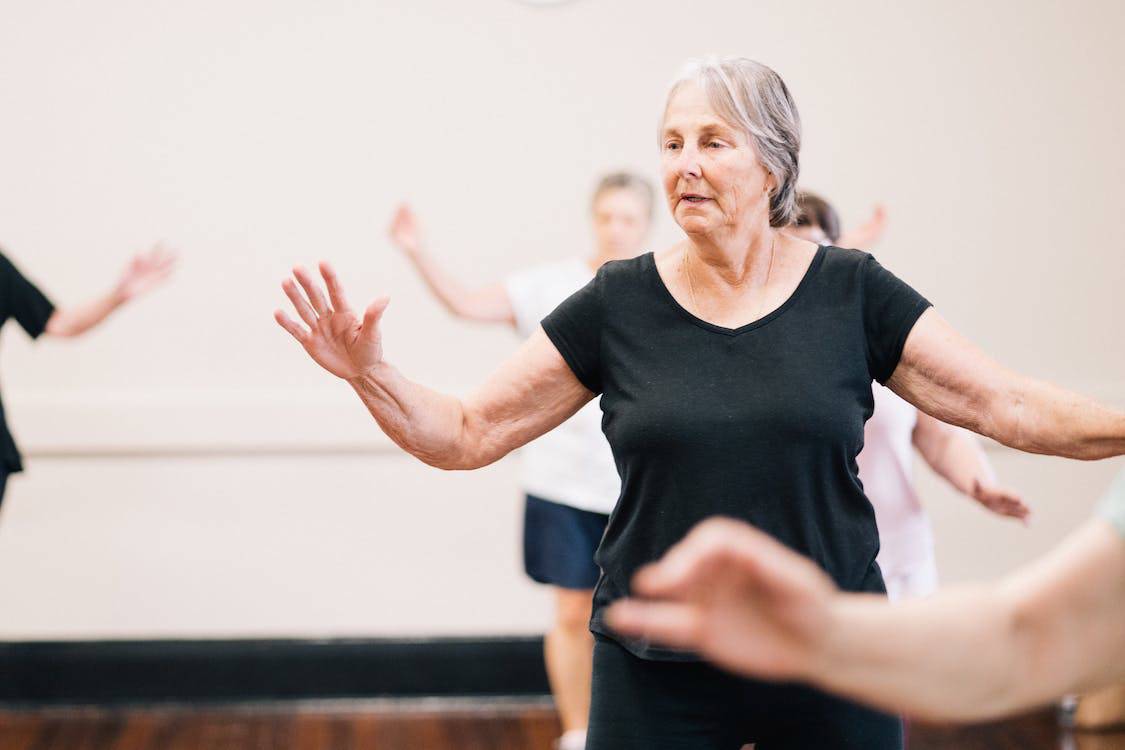
Difficulty: Medium
Safe exercises can help your loved one stay healthy and feel their best.
Try these exercises:
41. Walk
Difficulty: Easy
Going on outings with seniors living with dementia, like taking a brisk walk, is a great way to get some fresh air, do gentle exercise, and stimulate a variety of senses.
Social Activities

Seniors living in, or frequently visiting, a senior care facility will love to engage in the following creative activities that foster social connections with you or fellow seniors.
42. Balloon Volleyball
Difficulty: Medium
Balloon volleyball is an engaging activity that will help your loved one get some physical activity, work on hand-eye coordination, and increase mood. All you need to do is throw a balloon and then gently tap it to pass it to the next person.
Watch this video to see balloon volleyball in action:
43. Dance
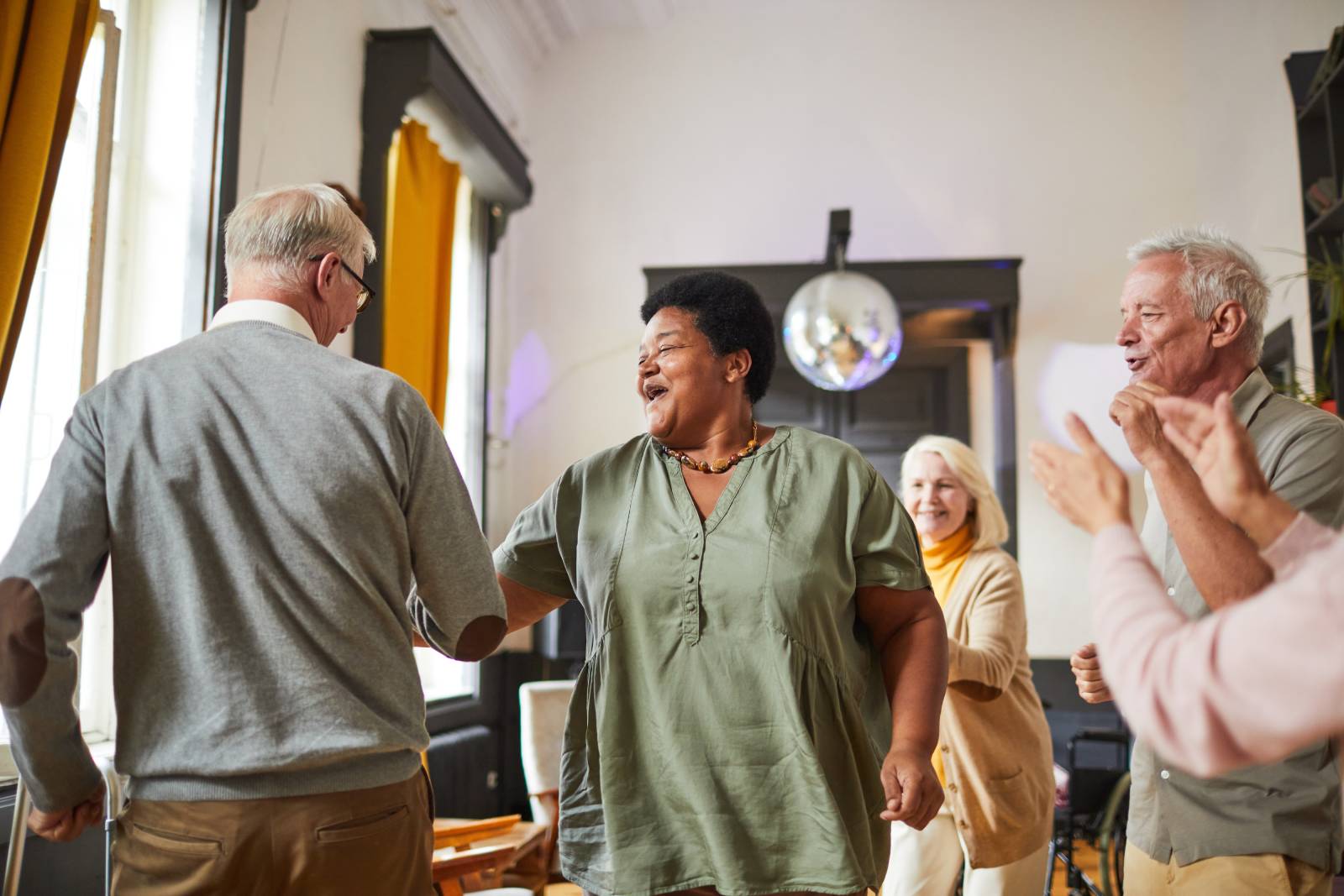
Difficulty: Easy
Turn on some great music and encourage your loved one to dance with you! Dancing is a fun way to help your loved one get physically active while evoking positive feelings.
Some fun songs to dance to:
44. Have a Themed Party
Difficulty: Easy
Host a themed party! Have attendees dress up as a specific theme to encourage social engagement and increase the emotional well-being of your loved one.
Theme ideas:
- The roaring 20s
- Pyjama party
- Masquerade ball
45. Bingo

Difficulty: Medium
Bingo is a fun way to help your loved one problem-solve, think critically, improve fine motor skills, and more.
Supplies:
- Number or letter callouts
- Bucket
- Bingo cards
- Bingo chips
46. Play Balloon Tennis
Difficulty: Medium
Balloon tennis is a great game that involves seniors hitting a balloon back and forth with a partner. This activity will help your loved one practice patience, improve hand-eye coordination, and get physical activity, all while encouraging social interaction.
Supplies:
- Paper plate
- Ruler
- Tape
- Balloon
Watch this YouTube video to see how to play:
47. Engage in Stimulating Conversation

Difficulty: Easy
Engaging in conversation is a great way to help seniors recall memories, stimulate the brain, and build relationships and companionship.
Conversation starter ideas:
- What city did you grow up in?
- Do you have any siblings?
- What was your favourite hobby growing up?
48. Play Board Games
Difficulty: Hard
Playing board games can encourage problem-solving skills, decision-making, and memory recall. Keep in mind that some board games are more difficult than others so try to choose board games that align with the cognitive level of your loved one.
Board game ideas:
49. Play Catch
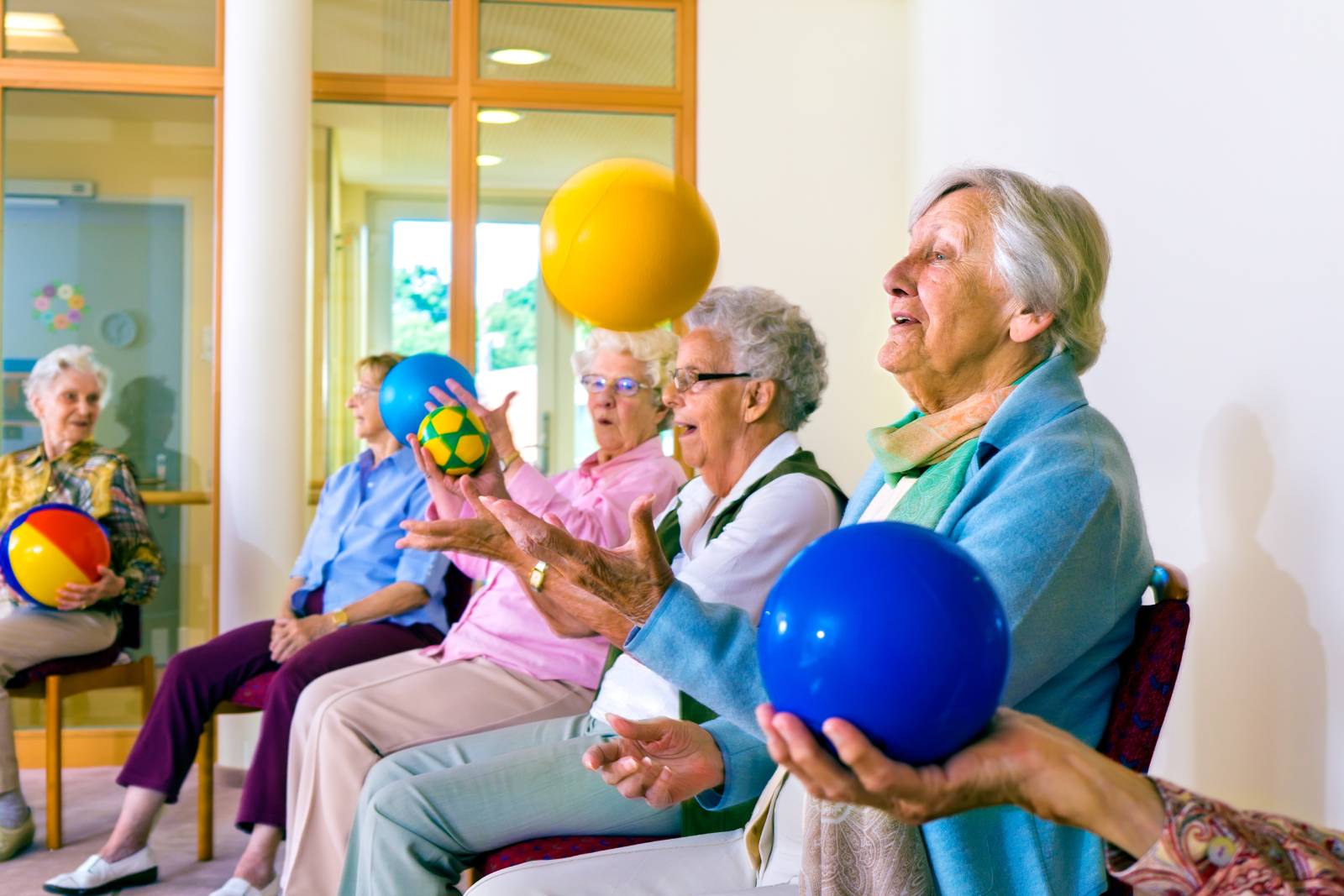
Difficulty: Medium
Playing a game of catch with a soft ball will help with hand-eye coordination, mental stimulation, and getting some physical activity.
50. Play Trivia
Difficulty: Medium
Playing trivia with your loved one can help them enhance their cognitive abilities by making them problem-solve, recall-related information from their memory, and uplift spirits. Feel free to ask questions with multiple answers so your seniors have a better chance of getting them right.
Some trivia questions you may want to consider using:
- Q: What is one of the largest mountains in the world?
- A: Mount Everest, K2, Makalu, Lhotse
- Q: What’s one of the major Winter Olympic events?
- A: Curling, Hockey, Luge, Skating, Alpine Skiing
- Q: What’s a famous British band from the ‘60s?
- A: The Beatles, The Who, The Rolling Stones
51. Bake Cookies
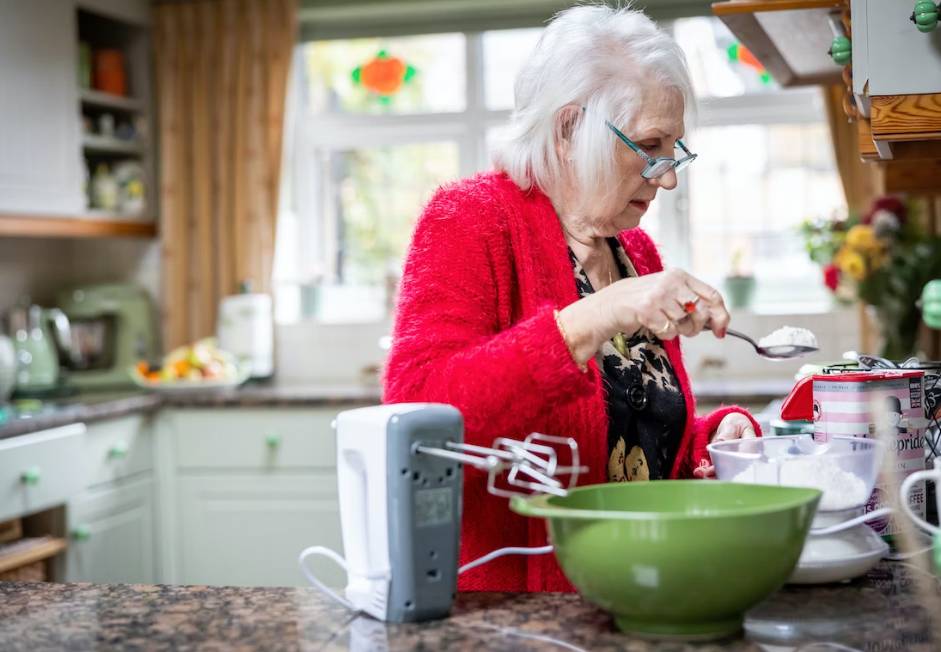
Difficulty: Medium
Try to help your loved one make some simple chocolate chip cookies. This activity will engage multiple senses, like touch, smell, taste, and feel. If your loved one is in the early stages of dementia, try to let them do most of the baking steps. If they are in late-stage dementia, assign them a simple roll, like mixing the ingredients.
Supplies:
- Chocolate chip cookie recipe
- Baking dish
- Whisk
- Spatula
- Cookie ingredients: Flour, sugar, baking soda, salt, chocolate chips
52. Have a Tea Party
Difficulty: Medium
Having a tea party can help your loved one build relationships, get them excited for an event, and boost morale.
Supplies needed:
- Tea
- Cups
- Decorations (if applicable)
Stimulating the Brain of Seniors With Dementia
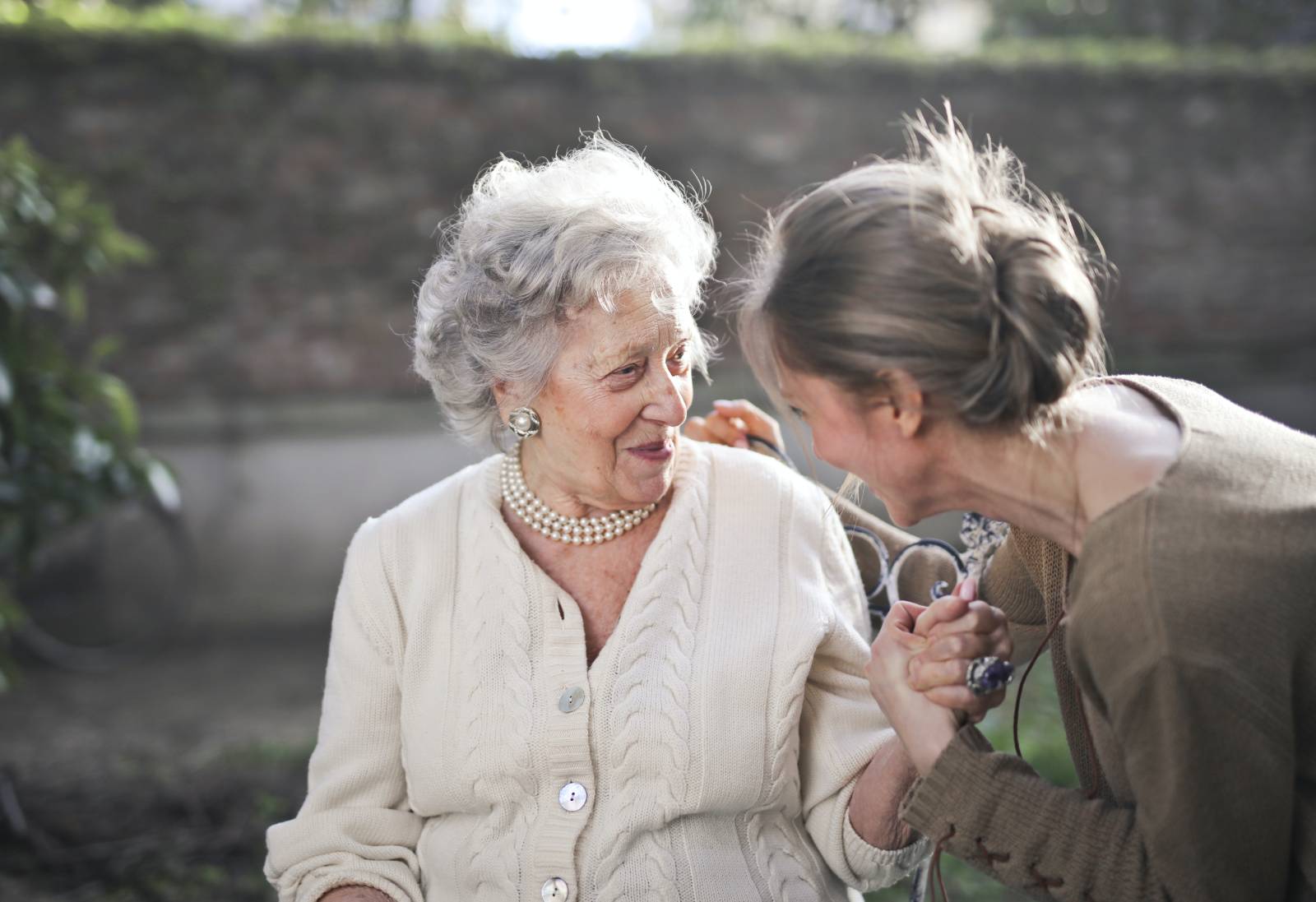
Brain, body, and social activities are great ways to help seniors living with dementia improve or maintain cognitive abilities and promote their emotional well-being.
We understand that you want the very best for your loved one living with dementia. However, caring for your loved one can be very time consuming, making it difficult for you to attend to your own needs or make time for other priorities in your life. At Ohana Care, our caregivers can visit your loved one on a daily or weekly basis and help them with stimulating activities so they continue to work their brains and stay happy and fulfilled.
At Ohana Care, we offer dementia care in Calgary, Edmonton, and Vancouver, so your loved one can get the support they need. We also provide respite care, companionship care, and Alzheimer’s care so family caregivers can take a break while our team of dedicated caregivers supports them.
Contact us to learn more about our dementia care services and how we can help create engaging and valuable hobbies for seniors with dementia.





